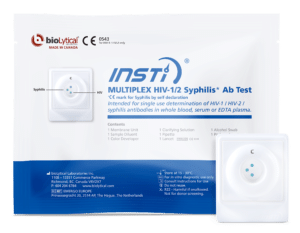- Our Productsclose
Our Products
Easy. Quick. Accurate.
- HIV and Testing
- Stories
- INSTI Times
- Our Productsclose
Our Products
Easy. Quick. Accurate.
- HIV and Testing
- Stories
- INSTI Times
The HIMM Project
Table of Contents
Introduction
We promote HIV testing as a normal thing to do every 3 months for MSM who are sexually active with multiple partners – it’s like getting an oil change or a haircut.
- The HIMM Project
The HIMM Project
The High Impact Men’s Movement (HIMM) Project is part of KC CARE Health Center, a Federally Qualified Health Center (FQHC) in Kansas City, Missouri. The project helps to make HIV testing accessible, uncomplicated and fast for Kansas City’s Men who have Sex with Men (MSM) community. As the city’s LGBTQ+ population rapidly grows and changes, HIMM has introduced new methods to encourage HIV prevention, including the exciting concept of a 7 minute quickie – where an individual can get tested, receive counseling and be linked to care all in the space of 7 minutes.
Testing with the HIMM Project takes place in several settings, including walk-in testing at the clinic every weekday, regular outreach testing at three different club nights and on-demand mobile testing. In each of these settings, the workflow is the same; paperwork, counseling, education, INSTI test and result. There are always two testing booths set up at the club nights to offer a seamless and confidential service. Non-reactive testers are connected to an onsite PrEP navigator, while reactive testers are provided with information on the next steps and are introduced to their ongoing care through KC Care Health Center.
Jonathon's Story
When Project Coordinator Jonathon Antle first joined the HIMM Project team, they were still using a more traditional form of rapid test which takes 20 minutes or more to provide results. “With the last test we were using, there were some concerns about window periods and the length of time it took for the test to run,” says Jonathon. “It made outreach testing too complicated.” They trialed INSTI to see if it could be a better fit. Jonathon explains, “Very quickly after trying INSTI in the field, we realized that a one-minute test would be ideal for use in public spaces and it could enhance our outreach programs.”
Jonathon adds that his clients find the process more approachable with INSTI, saying, “People think it’s cool! INSTI looks like a little chemistry set and they are fascinated by it. They can’t believe it only takes 60 seconds for a test result and they find it’s fun to watch.”
For Jonathon, the key to Quickie in the Club’s success is that it integrates with the community. By building trust and rapport, they have helped to break down the barriers that hold people back from knowing their status. Jonathon says, “Some of the venues we wanted to start testing in, like the clubs, are sexually charged environments. They were sometimes apprehensive about bringing HIV testing into that space. We built relationships with the owners of the venues and showed them that we are a sex-positive, no-judgement, fact-based program. We want to help people have the best sex lives they possibly can, and our job is just to make sure they are making informed choices. They were then able to see that this is something that would be valued by the community.”
He explains that another key to reaching specific populations through outreach testing is time. “Time matters,” he says, “When people are in a bar space, they are generally not there to get tested. They’re there to socialize and meet new people. Waiting 20-30 minutes for test results is a pretty big ask for someone on their Friday or Saturday night. Being able to do a complete counseling and testing session with INSTI in approximately 7 minutes is a much smaller ask and people are more likely to take that option.”
Before Jonathon joined the HIMM Project in 2016, he was pursuing a master’s degree in music theory, so working in the field of health was a major career shift for him. He was inspired by his own long road to accessing PrEP. Jonathon says, “It was a difficult process that took a long time. After I figured it out, I started to help my friends to get PrEP too. I grew up with an expectation that HIV would be in my future at some point, that having HIV would be inevitable. Going on PrEP really changed that for me and shifted the way I thought about my sexual health. I moved from being very passive and anxious about it to being proactive and confident. It was very meaningful for me and led me to pursuing my career in HIV prevention. The HIMM project offers a full set of services that help the community in their sexual life regardless of what their test results will be.”
The Future of Quickie in the Club
The HIMM Project is now in its last year of funding from the CDC, and Jonathon is optimistic about the future. He says, “We need to keep our finger on the pulse of what’s going on and consider how we can best contribute to ending the epidemic locally and nationally.” This year Jonathon also presented the results of Quickie in the Club to the HIV Diagnostics Conference and his oral presentation will be published in print later this year. “I hope others can take inspiration or learn lessons from what we have done,” says Jonathon.



